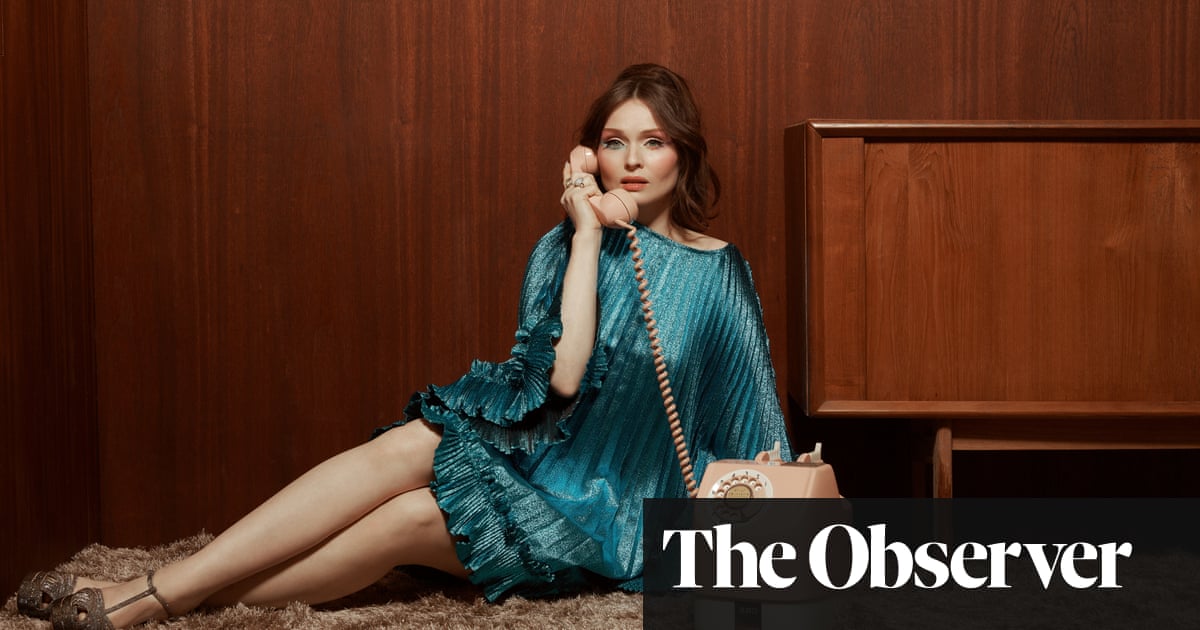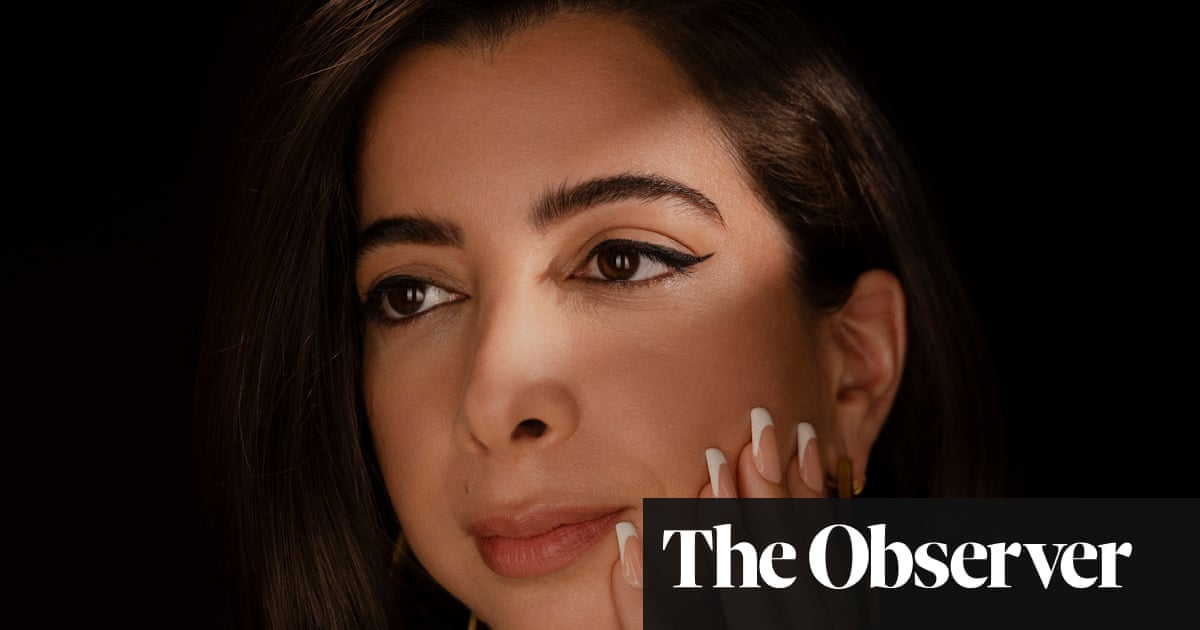
f there has been a small moment of joy in lockdown, it was the image of a silver-clad Sophie Ellis-Bextor, sequin-spattered kids in tow, performing her disco hits from her living room on a Friday night. The live-streamed party, during which she interrupted her hit song Take Me Home (the lyrics changed to “stay at home”) to tell one of her children: “Don’t step on the baby!” has become a weekly event to look forward to.
“Any kind of work at the moment is quite a challenge, I have to say,” she says. “On the second week, I really wasn’t in the mood. I was feeling quite flat and a bit down. Then I found myself putting my rollers in, putting my makeup on, choosing the songs, putting my sequins on ... and I felt lifted. Totally lifted.”
Ellis-Bextor is somewhat harried today, speaking on Skype from the music studio in her west London home – usually the domain of her husband, Richard Jones, the bassist in the Feeling. It is a cosy grotto, complemented by mic stands, neon lights and a guitar. It is, she says, the only place she can find respite from the strain of navigating lockdown with five children, four of whom were in school or nursery until a month ago, one of whom is trying to work on his GCSEs. “I didn’t set out to home-school my kids,” she says. “I don’t find it comes particularly naturally.”
She is much more accustomed to the glitz and chaos of showbusiness. She first spun into the music mainstream in 2000, with a feature spot on the song Groovejet (If This Ain’t Love) by Spiller, which remains a British radio staple, and she had a steady pop career with follow-up singles Murder on the Dancefloor and Music Gets the Best of Me, plus a run of seven albums. In 2013, she dazzled on Strictly Come Dancing, wowing the judges with, among other performances, a memorably bouncy whirl through the charleston. In the end, she lost out in the final to Abbey Clancy.
She was born into the world of entertainment: her mother, Janet Ellis, was a presenter on Blue Peter, while her father is the film producer Robin Bextor. She recalls a cosmopolitan childhood, filled with brunches and celebrity parties. “It definitely shaped me,” she says. She began performing in childhood, later moving into modelling. Before her chart success, she developed a cult following in the late 90s as the sultry singer of indie rock group Theaudience.
With her summer touring schedule wiped out due to lockdown, she is finding it hard adjusting to not performing. “I miss it terribly,” she says. “I miss performing, I miss all the plans I had ... but so does everybody.”
Growing up in the world of celebrity taught her early on that she would have to work at keeping her private life private. Before lockdown, the idea of letting a camera into her home, and filming her children, would have been inconceivable – but life has changed irrevocably. “I suppose, over the years, I’ve always been quite a private person,” she says. “I don’t normally show the inside of my house. I definitely never show my kids anywhere. But suddenly, I think with everything we’ve all been going through collectively, it just felt like that was totally irrelevant. Like, who cares? No one’s interested in prying; we just want to feel a connection. We just want something silly.”
The height of her fame came during a frenzied period for the tabloids, which were splashed with women of a similar age – such as Lindsay Lohan and Britney Spears – being pilloried for their lives seemingly careering out of control. She, too, was briefly tabloid fodder, when Groovejet went up against Victoria Beckham’s debut solo single, Out of Your Mind, for the No 1 chart slot. The perceived “battle” spawned sniping from both parties, most notably when Ellis-Bextor wore a T-shirt emblazoned “Peckham”, a tongue-in-cheek reference to her competitor’s name. In the end, Ellis-Bextor and Spiller won out.
“Some of it was probably just quite good fun,” laughs Ellis-Bextor. “Quite cartoony, wasn’t it? Victoria Beckham from the Spice Girls, who were massive and really well liked, and then someone who most people had never heard of ... I just found it bonkers. I tried to remember as much as possible, because I knew that I’d never find myself in a situation like that ever again.”
At one point, she toured with George Michael, but, bizarrely, never met him. “He’d built an entrance on the front of his dressing room, so that you couldn’t walk past it and see in accidentally. He was obviously just going through a bit where he needed a lot of privacy, for whatever reason.”
Did she feel the impact of being so young and under so much scrutiny from the media? “I’d grown up in that environment,” she says. “I learned in that environment. I do think it’s difficult sometimes for women to be given any sort of authority with their work, or for there not to be a question mark over who’s doing what behind the scenes, which I used to find so tedious when I was younger.
“When I started, I just felt like everybody assumes that the record company are making decisions for you all the time – you know, before you go and get your fringe cut, you have to go and see the board and ask if it’s OK. But, actually, I think some of that is a slightly misogynistic view, really – that a young woman wouldn’t be able to make her own decisions.”
While she is not widely known as a songwriter, she has written or part-written the bulk of her back catalogue. “Sometimes you can feel a bit insecure about the fact that most people assume you’re not doing any of that kind of thing. I was quite sensitive to it.” She learned – for better or for worse – to let it go. “I quickly realised that it wasn’t that relevant to people, if I write or not. The fact of the matter is: my job as a songwriter and my job as a singer are compatible, but they don’t depend on each other. But I don’t really want people wondering about who wrote what. I just want them to get lost in a story. I’ve written the majority of what I’ve done, but I don’t need people to necessarily think about that.”
After the success of Groovejet, she released her debut studio album, Read My Lips, in 2001 – for which she brought in musicians including Blur’s Alex James and Moby. She followed it up over the next decade and a half with five more studio albums, all breezy dance-pop records, most of which were big in Europe. In 2019, she released her seventh and most recent musical project, The Song Diaries, an orchestral reworking of her biggest hits.
Aside from Radio 2, Ellis-Bextor’s most committed fanbase is the LGBTQ+ community. Her melding of 70s disco aesthetic and 90s club hits enchant DJs and punters in gay clubs, and she is no stranger to the smoke machines of Soho, which has long been the centre of London’s gay scene. “My relationship with my gay fans is very precious to me – it’s shaped the career I have. After I had my first baby, I hadn’t performed for a while and I did my first gig back at [the London LGBTQ+ venue] G-A-Y ... I honestly feel like that night was pivotal for me. It was like a wall had come down and I felt my inhibitions go. Since then, I feel like I’ve been a different kind of performer.”
She rarely lets a summer pass without an appearance at a Pride festival (she headlined Birmingham Pride in 2017, London Pride in 2018 and Bristol Pride in 2019) and often tours with the drag collective Sink the Pink. At the mention of how much of the community has been caught up in the recent culture war over gender and transgender rights, she sits up in her chair.
“I think we’re now so much better at understanding the spectrum of gender and how people choose to identify and what feels right,” she says. “Of course, that’s so logical. Why on earth should someone say: ‘I need to adhere to that list of gender specifics’?”
“Once people feel like they can define themselves the way they want to, then we can have a debate about nuance,” she says. “What works for one transgender individual is not the same for another. We’ve got to get to a point where we can have their voices heard. But the main point is about just making sure that, socially and economically, [trans people] are supported in the right way.”
She is concerned about how gender roles are still imposed on children through consumer culture. “If you look at kids’ toys, it’s very much girls’ toys and boys’ toys, maybe even more than I remember when I was small. I don’t know if it’s some weird fear that, if you give kids lots of choice and let them interpret themselves as they are, then you’re going to encourage some sort of craziness. I think a lot of people feel very uncomfortable about it and I don’t really know why.”
On how she has broached the subject of gender identity with her five boys, her answer is simple and matter-of-fact: “I’m not really bothered about what they choose – I just want them to feel like they have choice. I’m sure that’s how most people must feel about raising their kids.
“Actually, I do meet some people, even close friends, who are surprisingly traditional in their thinking. I’ve been given my children and I can’t mould anything about them. I’ve just got to support them and love them and try to guide them. And that’s probably why most of them are feral,” she laughs.
For the foreseeable future, she will be at home, physically distancing with her husband and their boys. “Now that we’re a few weeks in, I’ve got better at not hanging off the news stuff all the time,” she says. “I feel a bit like I’m on a long-haul flight. The world’s going on out there, but for the time being this is what you’re doing, this is where you are. So you’ve just got to get on with it.”












